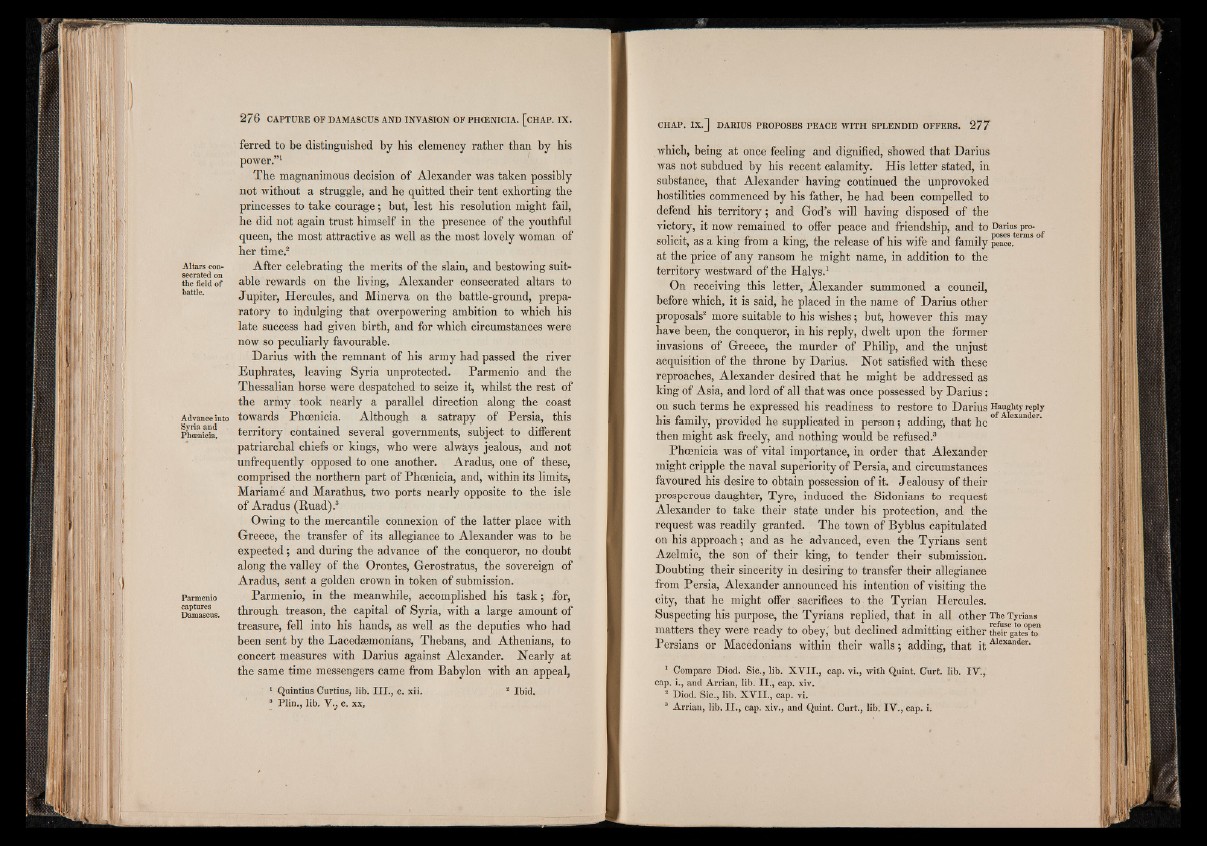
Altars consecrated
on
the field of
battle.
Advance into
Syria and
Phoenicia.
Parmenio
captures
Damascus.
ferred to be distinguished by his clemency rather than by his
power.”1
The magnanimous decision of Alexander was taken possibly
hot without a struggle, and he quitted their tent exhorting the
princesses to take courage; but, lest his resolution might fail,
he did not again trust himself in the presence of the youthful
queen, the most attractive as well as the most lovely woman of
her time.2
After celebrating the merits of the slain, and bestowing suitable
rewards on the living, Alexander consecrated altars to
Jupiter, Hercules, and Minerva on the battle-ground, preparatory
to indulging that overpowering ambition to which his
late success had given birth, and for which circumstances were
now so peculiarly favourable.
Darius with the remnant of his army had passed the river
Euphrates, leaving Syria unprotected. Parmenio and the
Thessalian horse were despatched to seize it, whilst the rest of
the army took nearly a parallel direction along the coast
towards Phoenicia. Although a satrapy of Persia, this
territory contained several governments, subject to different
patriarchal chiefs or kings, who were always jealous, and not
unfrequently opposed to one another. Aradus, one of these,
comprised the northern part of Phoenicia, and, within its limits,
Mariame and Marathus, two ports nearly opposite to the isle
of Aradus (Ruad).3
Owing to the mercantile connexion of the latter place with
Greece, the transfer of its allegiance to Alexander was to be
expected; and during the advance of the conqueror, no doubt
along the valley of the Orontes, Gerostratus, the sovereign of
Aradus, sent a golden crown in token of submission.
Parmenio, in the meanwhile, accomplished his task; for,
through treason, the capital of Syria, with a large amount of
treasure, fell into his hands, as well as the deputies who had
been sent by the Lacedaemonians, Thebans, and Athenians, to
concert measures with Darius against Alexander. Nearly at
the same time messengers came from Babylon with an appeal,
1 Quintius Curtius, lib. I I I ., c. xii. s Ibid.
8 Plin., lib. Vv c. xx,
which, being at once feeling and dignified, showed that Darius
was not subdued by his recent calamity. His letter stated, in
substance, that Alexander having continued the unprovoked
hostilities commenced by his father, he had been compelled to
defend his territory; and God’s will having disposed of the
victory, it now remained to offer peace and friendship, and to Darius pro-
solicit, as a king from a king, the release of his wife and family peaS. mS °
at the price of any ransom he might name, in addition to the
territory westward of the Halys.1
On receiving this letter, Alexander summoned a council,
before which, it is said, he placed in the name of Darius other
proposals2 more suitable to his wishes; but, however this may
have been, the conqueror, in his reply, dwelt upon the former
invasions of Greece, the murder of Philip, and the unjust
acquisition of the throne by Darius. Not satisfied with these
reproaches, Alexander desired that he might be addressed as
king of Asia, and lord of all that was once possessed by Darius:
on such terms he expressed his readiness to restore to Darius Haughty reply
his family, provided he supplicated in person; adding, that he e*an er'
then might ask freely, and nothing would be refused.3
Phoenicia was of vital importance, in order that Alexander
might cripple the naval superiority of Persia, and circumstances
favoured his desire to obtain possession of it. Jealousy of their
prosperous daughter, Tyre, induced the Sidonians to request
Alexander to take their state under his protection, and the
request was readily granted. The town of Byblus capitulated
on his approach; and as he advanced, even the Tyrians sent
Azelmic, the son of their king, to tender their submission.
Doubting their sincerity in desiring to transfer their allegiance
from Persia, Alexander announced his intention of visiting the
city, that he might offer sacrifices to the Tyrian Hercules.
Suspecting his purpose, the Tyrians replied, that in all other The Tyrians
matters they were ready to obey,' but declined admitting either tLirgltes11™
Persians or Macedonians within their walls; adding, that i tAlexander-
1 Compare Diod. Sic., lib. X V I I ., cap. vi., with Quint. Curt. lib. IV .,
cap. i., and Arrian, lib. I I ., cap. xiv.
8 Diod. Sic., lib. X V II., cap. vi.
3 Arrian, lib, I I . , cap. xiv., and Quint. Curt., lib. IV ., cap. i.